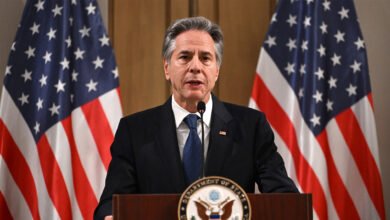What a ruling by Ontario’s top court could mean for the future of climate litigation

In what some have called a game-changing decision, an Ontario court has ruled that the provincial government’s weakened climate target could violate the Charter of Rights and Freedoms.
Ecojustice, Canada’s largest environmental law charity, says the decision marks the first time that Ontario’s highest court has ruled that a government’s climate actions are subject to the Charter. Ecojustice backed the seven young people who brought forward the case.
While the case now goes back to a lower provincial court, experts say the decision has sent shockwaves through some legal and policy circles — and could have meaningful consequences for governments that dial down their climate commitments.
“This decision is a game-changer,” said Stewart Elgie, who specializes in environmental and natural resources law at the University of Ottawa. “This is the strongest decision ever in Canada about a constitutional obligation to address climate change.”
Here’s a closer look at the ruling and how it could shape future climate cases.
What the court said
On Thursday, the Ontario Court of Appeal ruled that a lower court made mistakes when handling the youth-led constitutional challenge of Ontario’s climate target.
In a unanimous decision, three Ontario appeal court judges ordered the Ontario Superior Court to take another look at the case. It also concluded that the Charter of Rights and Freedoms applies to this case.
The appeal court did not determine whether Ontario had violated the Charter.
The Charter of Rights and Freedoms is part of Canada’s Constitution, the highest law in the land. Section seven of the Charter affirms the right to “life, liberty and security of the person.”
The young people who brought the case argued that the Ontario government’s response to climate change commits the province to a dangerously high level of greenhouse gas emissions, infringing on section seven.
In particular, they took issue with the emissions targets set when Premier Doug Ford first took office.
The Ford government scrapped Ontario’s cap-and-trade system and replaced the emissions reduction target of 37 per cent below 1990 levels by 2030 with a new target of 30 per cent below 2005 levels.
The judges noted that, according to unchallenged expert evidence, this was a weaker target and fell short of what international science says is needed.
These emissions, the youth argued, cause harm to Canadians now and to future generations, violating section 15 of the Charter, which prevents laws or government policies from discriminating against Canadians based on age and other criteria (race, national or ethnic origin, colour, religion, sex or mental or physical disability).
The appeal court judges concluded that by having climate legislation, Ontario was “obligated to produce a plan and a target that were Charter compliant.”
Emmett Macfarlane, a constitutional expert and politics professor at the University of Waterloo, said the decision “basically gives the claimants a second kick at the can at the trial level.”
While the ruling isn’t an outright win, it is “a reversal of the application judge’s initial dismissal of the claim, and breathes new life into the case for the claimants,” he said in an email.
Why it’s such a big deal
While the case is far from settled in Ontario, several experts told CBC News the appeal court ruling could have an impact on legal challenges beyond Ontario.
Sébastien Jodoin, associate professor at McGill’s faculty of law, said it could have implications for potential challenges in other provinces and at the federal level.
“This decision opens the door for other cases that challenge policy decisions made by governments where they are backtracking on climate targets they’ve set in the past, or moving away from climate targets that the previous government might have set,” said Jodoin, who has supported climate litigation challenges in the past.

Jodoin said that if the next federal government reverses some of the current government’s climate policies, there could be strong grounds for a challenge if those changes “backtrack on Canada’s targets and commitments in terms of reducing carbon emissions.”
The ruling brings Canada in line with some court decisions in Europe, where courts have been more accepting of the idea “that governments are obliged to reduce their carbon emissions in order to fulfil their obligations to respect the human rights of their citizens,” Jodoin said.
“Canada had been kind of lagging behind this global trend.”
While Canadian courts have been reluctant to wade into judicial activism, Elgie said the Ontario court decision strikes a necessary balance.
“The court is not telling governments how to tackle climate change,” he said. Instead, the courts are telling governments that once they commit to addressing climate change, even under a previous administration, climate targets and plans must be sufficient to protect people’s lives and avoid dangerous emissions, he said.
Macfarlane takes a different view. He said the ruling is far from straightforward and questioned “whether the Ontario legislature is free to simply repeal the law and render this case entirely moot.”
What’s next
Nathalie Chalifour, a law professor at the University of Ottawa, said she expects the applicants to ask the Ontario Superior Court to hold a new hearing as soon as possible.
“There are examples of courts around the world fast-tracking climate cases in light of the urgency, so I expect they will seek to fast-track this case,” she said.
The Ontario Superior Court, she said, will have “to analyze whether Ontario’s target and plan violate the youths’ right to life, security of the person, and equality.”
Fraser Thomson, an Ecojustice lawyer, said the ruling effectively “boxes Ontario into a corner.”
“The decision brings us a giant step closer to ensuring that Ontario answers for its inadequate climate action,” he said.
A spokesperson for Ontario’s Attorney General stressed that “no decision from the Court of Appeal was made regarding the constitutionality of Ontario’s climate change plan or target.”
“We are on track to meet emissions reduction targets and will continue to build on our success,” Jack Fazzari said in an email.
Source link



